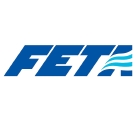FETA expresses concern about renewable stimuli

FETA, the Federation of Environmental Trade Associations, has expressed concern about the Government reducing incentives for certain renewable-energy technologies — in particular, heat pumps. Speaking at the association’s annual lunch, its chairman Graham Wright said, ‘Technologies such as heat pumps will continue to need Government support to reach a state of maturity to become self sustaining We are currently at high risk of stalling any growth that has been achieved in this sector, and the alarm bells are ringing in many areas.’
He reported that FETA members are working with the Government to influence this process but that further work is needed to make the installation of heat pumps much less arduous for the specialists who carry out the work and for home owners keen to make use of renewable-energy-sources.
With the date for the EU referendum approaching, he said, ‘There have been varying views on how it may affect our industry given the fact that, whatever the result, the majority of regulation comes from the EU.’
He explained that FETA is very active in a wide range of ISO, CEN and BSI committees, influencing and setting standards. ‘We fully expect this activity to continue without change.’
Graham Wright said, ‘Whatever the future may hold, European regulations will remain a dominant factor which will have both technical and commercial consequences for manufacturers. You may rest assured that FETA will continue to interact with European organisations at all levels to further the interest of all its members.’







